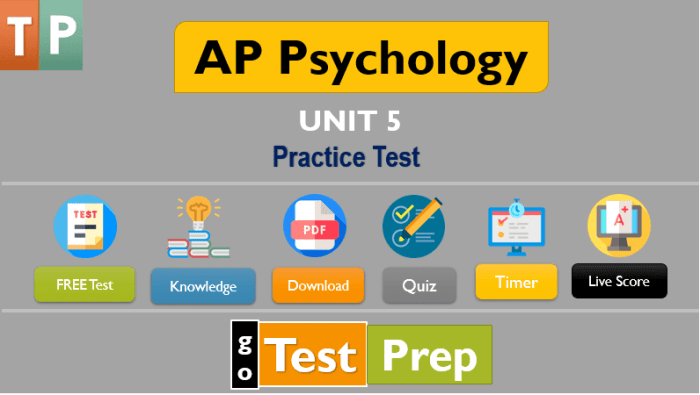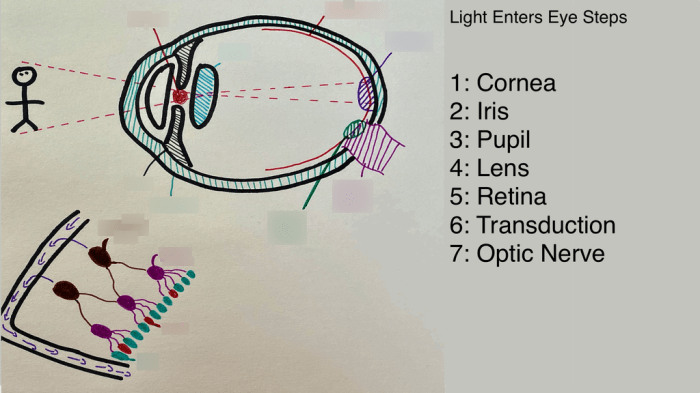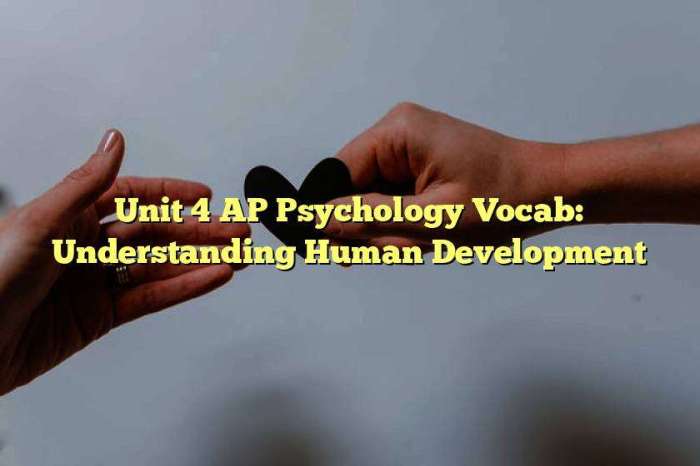Unit 4 AP Psychology Vocabulary: A Comprehensive Guide to Key Concepts delves into the intricate world of psychology, providing a thorough exploration of the fundamental principles, theories, and applications that shape this fascinating field.
From defining core concepts to examining groundbreaking theories and research methods, this guide offers a comprehensive understanding of the complexities of human behavior and mental processes.
Key Concepts and Terms: Unit 4 Ap Psychology Vocab

Unit 4 of AP Psychology delves into the intricate world of learning, memory, and cognition. At its core lies the understanding of how we acquire, store, retrieve, and use information. This unit explores the fundamental principles that govern these cognitive processes, providing a comprehensive framework for comprehending the human mind.
Key concepts and terms in this unit include:
- Learning: The relatively permanent change in behavior or mental processes resulting from experience.
- Memory: The ability to encode, store, and retrieve information.
- Cognition: The mental processes involved in acquiring knowledge and understanding, including perception, attention, language, problem-solving, and decision-making.
- Classical conditioning: A type of learning in which a neutral stimulus is paired with a meaningful stimulus, leading to the neutral stimulus eventually eliciting the same response as the meaningful stimulus.
- Operant conditioning: A type of learning in which the consequences of a behavior influence the likelihood of that behavior being repeated.
- Implicit memory: Memory that is accessed automatically and unconsciously, such as procedural memory (e.g., riding a bike) and priming (e.g., being more likely to recognize a word that has been recently presented).
- Explicit memory: Memory that is accessed consciously and intentionally, such as episodic memory (e.g., remembering a specific event) and semantic memory (e.g., knowing the meaning of a word).
These concepts and terms are essential for understanding the complexities of human learning, memory, and cognition. By exploring these concepts in-depth, students gain a deeper appreciation for the remarkable abilities of the human mind.
Theories and Models

Theories and models are essential tools in psychology, providing frameworks for understanding and explaining complex psychological phenomena. They help organize and make sense of the vast amount of information gathered through research, and guide the development of new hypotheses and predictions.
Psychoanalytic Theory
Psychoanalytic theory, developed by Sigmund Freud, focuses on the role of unconscious processes, childhood experiences, and defense mechanisms in shaping personality and behavior. It emphasizes the importance of early childhood experiences and the influence of unconscious desires and conflicts on adult behavior.
For example, psychoanalytic theory can be used to explain why someone might have a fear of heights. According to this theory, the fear could be rooted in an unconscious conflict or unresolved trauma from childhood.
Behaviorism
Behaviorism, associated with B.F. Skinner, emphasizes the role of learning and reinforcement in shaping behavior. It views behavior as a response to environmental stimuli, and focuses on observable and measurable behaviors.
Behaviorism has been used to develop effective techniques for modifying behavior, such as token economies and behavior shaping. For instance, behaviorism can be used to help a child with autism learn new skills by rewarding them with tokens for desired behaviors.
Cognitive Psychology
Cognitive psychology focuses on the mental processes involved in perception, memory, language, and problem-solving. It emphasizes the role of internal mental representations and processes in shaping behavior.
Cognitive psychology has led to the development of theories and models that explain how we perceive and process information, such as the information-processing model of memory. This model can be used to explain why we sometimes forget things or why we have difficulty remembering information.
Humanistic Psychology
Humanistic psychology, associated with Carl Rogers and Abraham Maslow, emphasizes the importance of free will, personal growth, and self-actualization. It focuses on the subjective experiences of individuals and their potential for growth and development.
Humanistic psychology has been used to develop therapeutic techniques that focus on helping individuals achieve their full potential, such as person-centered therapy. For example, person-centered therapy can be used to help a client develop a stronger sense of self-worth and self-acceptance.
The concepts covered in Unit 4 of AP Psychology are fundamental to understanding human behavior. One interesting application of these principles is the Samba application, a tool that allows researchers to collect and analyze data on social interactions . By incorporating the concepts of social cognition, group dynamics, and interpersonal communication, the Samba application provides valuable insights into the complexities of human relationships, further enriching our understanding of the topics explored in Unit 4.
Biological Psychology
Biological psychology focuses on the biological bases of behavior, including the role of the brain, nervous system, and genetics. It emphasizes the influence of biological factors on psychological processes and behaviors.
Biological psychology has led to the development of treatments for mental disorders that target specific neurochemical imbalances or brain structures. For example, antidepressants are used to treat depression by increasing the levels of certain neurotransmitters in the brain.
Research Methods

Research methods are systematic and objective procedures used to investigate psychological phenomena. They allow researchers to collect and analyze data to test hypotheses and theories. Various research methods are employed in AP psychology, each with its strengths and weaknesses.
Observational Methods
Observational methods involve observing and recording behavior without directly interacting with participants. They are useful for studying naturalistic behavior in real-world settings.
- Naturalistic Observation:Observing behavior in its natural environment, such as observing children’s play in a playground.
- Structured Observation:Observing behavior in a controlled setting using predetermined categories and recording methods, such as observing shoppers’ behavior in a grocery store.
Experimental Methods, Unit 4 ap psychology vocab
Experimental methods involve manipulating one or more variables to determine their effects on behavior. They allow researchers to establish cause-and-effect relationships.
- Laboratory Experiments:Conducted in controlled laboratory settings, where researchers can manipulate variables and measure outcomes precisely, such as studying the effects of stress on memory.
- Field Experiments:Conducted in real-world settings, where researchers manipulate variables and observe the effects in a more naturalistic context, such as studying the effects of a new intervention on student behavior.
Survey Methods
Survey methods involve collecting data from a large sample of participants using questionnaires or interviews. They are useful for gathering information about attitudes, beliefs, and behaviors.
- Surveys:Participants complete written questionnaires that ask questions about their thoughts, feelings, and behaviors.
- Interviews:Researchers ask participants questions verbally and record their responses.
Case Studies
Case studies involve in-depth investigations of individuals or small groups. They are useful for studying rare or complex phenomena.
- Single-Case Studies:Focusing on one individual or group to provide a detailed account of their experiences, behaviors, and psychological processes.
- Collective Case Studies:Studying a group of individuals with similar characteristics or experiences to identify patterns and commonalities.
Applications of Psychology

Psychology finds practical applications in numerous fields, extending beyond the confines of research laboratories and academic institutions. Its principles and insights are harnessed to address real-world challenges and enhance human well-being.
In the realm of education, psychology plays a pivotal role in understanding and improving teaching methodologies, learner motivation, and overall academic performance. Psychologists collaborate with educators to develop curricula, design effective learning environments, and provide support to students facing academic or behavioral difficulties.
Healthcare
Within the healthcare system, psychology contributes to the diagnosis and treatment of mental health disorders, chronic pain management, and rehabilitation programs. Psychologists work alongside medical professionals to provide psychotherapy, cognitive-behavioral therapy, and other evidence-based interventions to promote mental and emotional well-being.
Business
In the business world, psychology is utilized to optimize employee performance, enhance workplace productivity, and foster a positive organizational culture. Psychologists assist in designing training programs, conducting employee evaluations, and resolving workplace conflicts. Their expertise in human behavior and motivation helps businesses create a more productive and fulfilling work environment.
FAQ
What are the key concepts covered in Unit 4 AP Psychology?
Unit 4 AP Psychology covers a wide range of key concepts, including learning, memory, cognition, motivation, and emotion.
How can I effectively study the vocabulary for Unit 4 AP Psychology?
To effectively study the vocabulary for Unit 4 AP Psychology, it is recommended to use flashcards, practice active recall, and engage in spaced repetition.
What are the most important theories and models discussed in Unit 4 AP Psychology?
The most important theories and models discussed in Unit 4 AP Psychology include classical conditioning, operant conditioning, social cognitive theory, and humanistic psychology.
How are research methods used in Unit 4 AP Psychology?
Research methods used in Unit 4 AP Psychology include experiments, surveys, and naturalistic observation.
What are some real-world applications of psychology discussed in Unit 4 AP Psychology?
Real-world applications of psychology discussed in Unit 4 AP Psychology include using psychological principles to improve education, healthcare, and business practices.